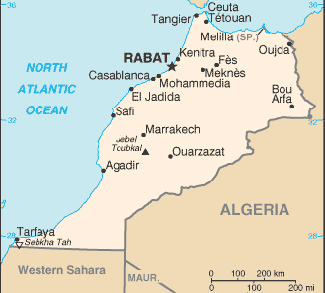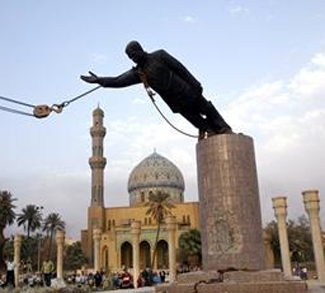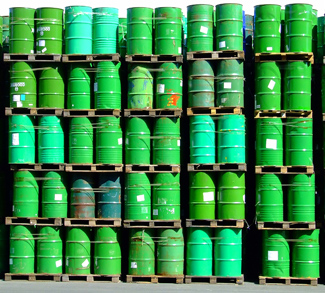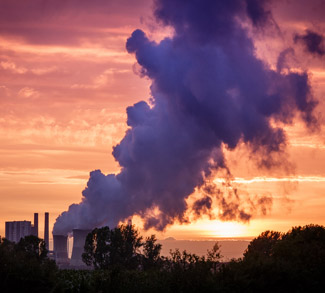On March 2, Kosmos Energy put out a statement that its CB-1 exploration well, located in the Cap Boujdour offshore Moroccan desert, tapped on 46 feet of gas and condensate pay in classic reservoirs. The discovery, however, did not amount to commercial and quality levels and therefore the oil operator decided to pull the plug and abandoned the well.
That was, by no means, surprising news. It was just the latest in a string of failing attempts to usher Morocco into the league of oil-producing countries.
The eminent question that usually comes along with shortcomings of this kind is: Does oil represent a curse or a blessing? To reach a fair verdict, it is essential to look at the context that defines whether an oil boom is a catalyst to an economic turnaround or a set-up for political fall-down.
Regardless of what the cards are holding for Morocco in terms of an oil boom and independently of how fragile or robust its political fabric is, pursuing security in the age of global insurgency without breaching the rule of law has proven itself to be a tricky path for robust and fragile democracies alike.
The country has recently been stripped of its title as ‘the exception’ in the MENA region and dragged into the war on terror with the Islamic State as a main counter-terrorism target. This will definitely bear its own implications and will forcefully pull the political climate of the country more towards the rules of engagement.
As in the case of the US, UK and the rest of Europe, Morocco will fight its threats on the ground the best way it can as well as in courts. We have been watching how counter-terrorism policies have triggered significant criticism from civil rights advocates in the United States in the cases of detainees held at Guantanamo Bay. There have been concerns about the treatment of defendants in terrorism trials and their full access to the judicial system, including the right to habeas corpus and legal representation. The legal spectrum in the U.S. seemed at some point to have granted Carte Blanche to law enforcement.
Bearing in mind the relative novelty of this threat and how different judicial systems are trying to deal with it, Morocco will have its fair share to deal with. We will not, however, witness the same dilemmas experienced by the US system given the incomparable rules of engagement for the two countries. All defendants in terrorism cases are being tried in civilian courts, partly because the majority of them are full Moroccan citizens or hold dual citizenships, mainly French or Belgian, and Morocco has been courted by France, Belgium, and the Netherlands to bolster judicial cooperation by speeding up extradition processes and accessing cases that cut across the security affairs of these countries. The main concern here is not the trials per se but it is rather the risk of having the fight against terrorism as a free ride on the rights of individuals and pinning cases à la carte, which could clip the wings of the undeniably significant headways that have been made in the aftermath of the Arab Spring.
Halted oil exploration and eventual production does not mean Morocco will be spared the evils of insurgents using oil revenues and ransom to finance their enterprise. Rather it puts a moratorium on domestic tensions that are lurking and risk breaking out at any moment. Ask the United States or any major world power and they will tell you they would rather go blind than see a new pocket for another Islamic State offshoot in the region and we have seen how oil and the urge to rule have been fueling one another in Iraq and Syria. Morocco is remotely out of this calculus, but it has the separatist movement of Polisario as a ticking bomb on its southern borders. So far, tensions have not gone beyond assertions of territorial integrity on the Moroccan side and the right of secession on the Polisario’s. The CB-1 exploration well lies literally at the heart of this spectrum and it does not take a rocket scientist to connect the dots for when oil rigs get up and running, just look at the two Sudans, Kurdistan, and most recently the Houthis in Yemen.
Drawing on this picture, there has been a wide consensus that oil is a curse in certain contexts, including the so-called failed states and fragile democracies.
Oil per se is not a curse. It is the context that defines whether it leans towards being a curse or a blessing. Consider the oil boom in the United States. The transition from being an importer to a rising exporter of natural gas has been happening smoothly and no lives have been taken militarily nor does it seem to impoverish middle classes by strengthening the rich and well-off. This is a success model that does not stand a chance in the aforementioned contexts, and the current situation articulately speaks to that.
Therefore, it all comes down to the notion of rule of law and accountability. The U.S. has been navigating its oil boom smoothly but not corruption-free. In traditional democracies, corruption is amazingly opaque. It takes the form of awarding large contracts to businesses with political influence, selling political seats of incumbent presidents and the like. In aspiring democracies such as Morocco or any other country in the region, corruption is front stage for everyone to see. It is so imbedded in everyday life that so many practices are not even questioned anymore, and this is not the biggest issue of all. The trouble resides in the type of accountability this issue is given. Rule of law without accountability is just a meaningless forgazi.
Consider policing for instance. Everybody remembers Michael Brown, the unarmed teenager who was shot dead by police officer Darren Wilson in Ferguson. A grand jury in that matter decided against indicting the police officer. On 17 July 2014, two weeks earlier, Eric Garner got engaged in a confrontation with police officer Daniel Pantaleo who put an illegal chokehold that ultimately took Garner’s life. Again, the police officer was let go free. The two incidents and their outcome prompted protests that roiled the country for weeks and following stiff pressure from the public, things started taking a new turn. Walter Lamer Scott, 50, was stopped for having a broken rear light on his car in North Charleston, South Carolina. As he was running away, police officer Michael Slager shot him eight times from behind. Mr. Scott died on the spot and Mr. Slager has been charged with murder. In another incident Texas police officer Eric Casebolt threw a female teenager to the ground and pointed his gun at other teenagers during a pool party 911 call. The scene went viral and the officer resigned from the police force.
In other words, these instances indicate a positive trend in shifting from a ‘raw’ rule of law pattern to a system that has accountability at its core. Communities need to keep their faith in the rule of law by seeing law enforcement bodies held accountable for their actions and this is exactly the missing part in aspiring democracies. In Morocco, there have been a slew of amateur videos posted on Facebook of police officers taking bribes from truck drivers and informal transport workers in rural areas. After the footage overwhelmed social media, police came down hard on some of their accusers and that opens the question of accountability and rule of law wide open. The identities of these police officers has not been disclosed and there is no news of what has become of them. Later on, the king appointed Abdellatif Hammouchi to the top of the General Directorate for National Security. He started off his tenure by cracking down on top-level officials involved in cases of corruption and embezzlement. As a member of public opinion, I believe that while people take backstage corruption offences seriously, they are not hurt nor do they directly benefit from having senior officials ousted from their positions. Public eye would like to see ground-level reforms that give them a sense of holding accountable the stewards of their communities, be they law enforcement individuals or business decision makers.
This is Morocco’s milieu on the eve of a possible oil discovery and it foreshadows the likely trajectory once oil comes on stream as a revenue source. It could thus be said that having failed to reach viable volumes of gas at this critical point in time is a blessing. There has not been any major exploration afterwards, but a few gulf countries are stepping in once more to invest in surveying operations, and this levels the field for Morocco to be an energy producing country without necessarily having to endure the evils of oil when geopolitics and domestic governance go awry.
The opinions, beliefs, and viewpoints expressed by the authors are theirs alone and don’t reflect any official position of Geopoliticalmonitor.com.




